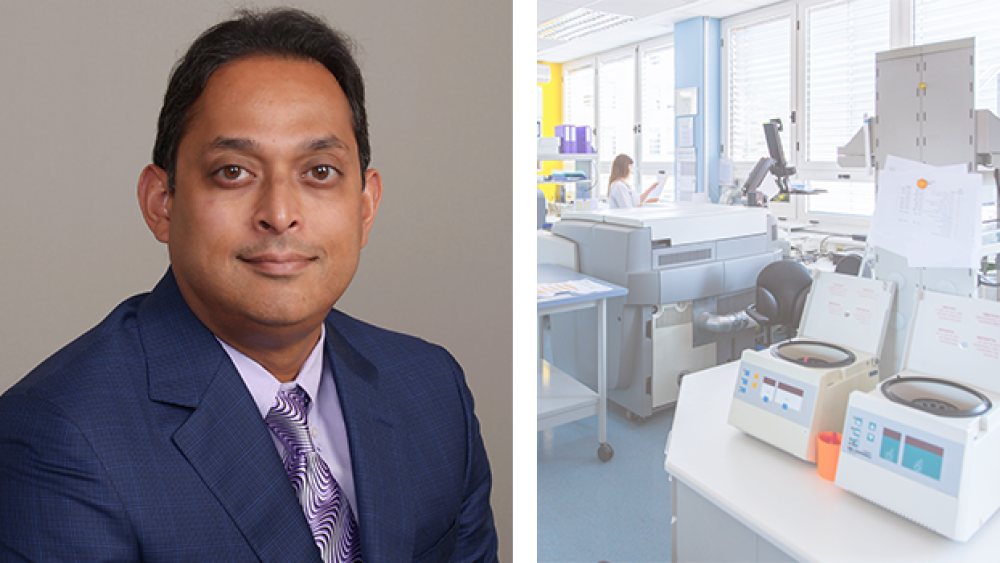EXUMA Biotech is developing a new modality to produce CAR cells in a single day, with potentially lower toxicity and higher efficacy without the need for preparative chemotherapies.
EXUMA VP Oncology, R&D Sid Kerkar, M.D/Courtesy EXUMA Biotech
EXUMA Biotech is developing a new modality to produce chimeric antigen receptor (CAR) cells in a single day, with potentially lower toxicity and higher efficacy without the need for preparative chemotherapies. Its novel technology supports a four-hour uptake of lentiviral vectors and a subcutaneous delivery that generates CAR-producing synthetic lymph nodes with the potential to mediate potent anti-tumor activity with reduced infectious side effects.
“We’re very excited about this technology,” Sid Kerkar, M.D., VP Oncology, R&D at EXUMA told BioSpace during the American Association for Cancer Research (AACR) Annual Meeting where his team is presenting two posters. While at the National Cancer Institute, Kerkar was on the original team, led by Dr. Steven A. Rosenberg, that helped bring the first CAR-T therapies to market.
“CAR therapies have shown great effectiveness in hematologic cancers,” Kerkar said. “What we need is to improve safety and accessibility and decrease the cost of manufacturing the CAR-T therapies.”
As EXUMA’s team assessed the challenges inherent in developing and delivering CAR therapies, it became apparent that subcutaneous injections offered advantages. Using EXUMA’s lentivector technology, “We are able to create synthetic lymph nodes, which become CAR factories.” The lymph nodes are a collection of immune cells, so by creating synthetic lymph nodes, EXUMA can generate CAR T and natural killer (NK)-like cells within the body to generate an anti-tumor immune response against B-cell malignancies. EXUMA calls them CAR-TaNK cells.
As explained at AACR, injecting CD3-directed lentiviral vectors loaded with peripheral blood mononuclear cells (PBMCs) caused lymph nodes to form at the site of the injection, as well as to develop distinct CD3+ CD8+ CD56+ NKG2D+ CAR-TaNK cells. Those cells proliferated more efficiently than traditionally manufactured CAR-T cells in lymphoreplete mouse models. With a threshold of as few as 10,000 cells, they began eliminating the target cells.
“CAR-TaNK is a cell therapy. The injected cells (that create the synthetic lymph nodes) have been modified by the viral vector before they will be injected into patients,” Kerkar said, and are what makes expansion without lymphodepletion possible. “This is a very novel technology that requires extensive process characterization.”
The speed of development for CAR-TaNK cells is another differentiator. “We are able to make these cells in one day, he said. After exposing the PBMCs to the viral vector, they are washed and administered without needing any ex vivo cell culture steps. That helps make the delivery time frame competitive with off-the-shelf therapies.
The proprietary vector design enables synthetic lymph nodes to form and, within them, the CAR cells to expand robustly in an environment that doesn’t require lymphodepletion. Therefore, this method doesn’t require the patient to receive chemotherapy, which depletes the body’s own T cells.
The process has been likened to the natural T cell maturation process. The CAR-TaNKs are thought to mature in a more natural way than other manufactured T cells that are injected systemically, to migrate to tumors and induce anti-tumor immunity. Although the CAR-TaNK program is in preclinical development, Kerkar suggested this therapy has the potential to be as efficacious as other CAR therapies, but with less toxicity.
EXUMA currently is conducting investigational new drug (IND)-enabling studies, using its CAR-TaNK program to target CD19 and CD22. Kerkar said he expects the CAR-TaNK therapy to enter the clinic in 2023.
The company also is developing an in vivo engineered CAR gene therapy program (GCAR) as a next-generation platform. Here, the viral vector is injected directly into the lymph node, where the CAR cells grow in vivo. Therefore, Kerkar says, “It has the potential to significantly decrease the cost of therapy because the manufacturing process is much less cumbersome and highly scalable. There’s no need to manipulate cells ex vivo or grow them in culture.”
Sharing the GCAR data for the first time, the AACR presentation indicated that “CD3-directed self-inactivating lentiviral vectors can efficiently deliver an integrating CAR gene into T lymphocytes following in vivo administration.” Once there, they expanded, effectively eliminated the existing B cells and produced functional CAR T cells. As such, GCAR has the potential to address the challenges of long manufacturing times, high costs and issues of scalability that face current cell therapies.
Preclinical data suggests both CAR-TaNK and GCAR can be effective against hematologic malignancies, but neither program has yet entered the clinic.






